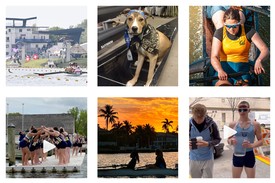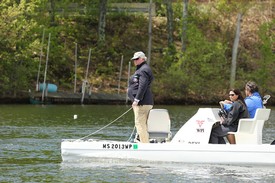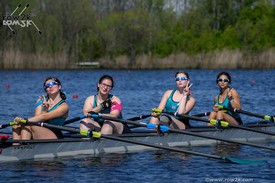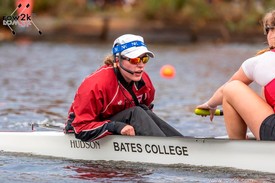The 1980 Olympic Boycott: Rowers on Missing the Games - Part 1
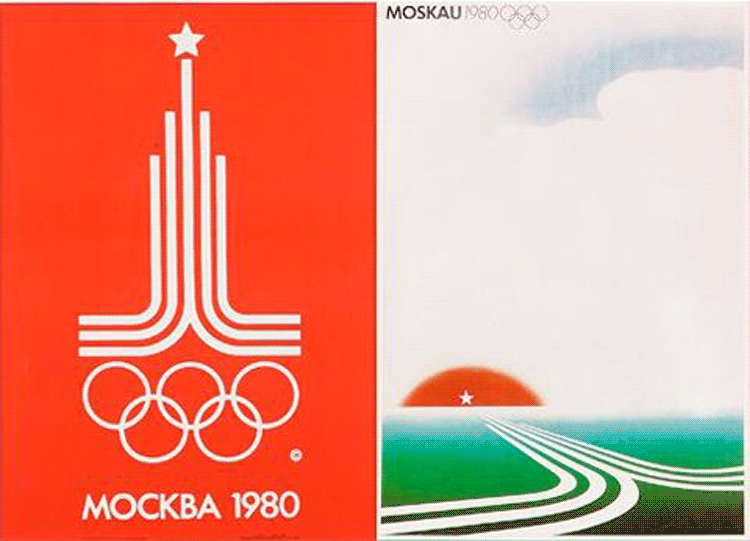
Every four years, the sporting world turns its attention (and its various discontents, ills and anxieties) towards the Olympic Games; earlier this year, it appeared that 2020 would be no different, with preparations in Japan running at a fever pitch for the start of the Tokyo Games, and athletes gearing up for trials and selection.
Then, of course, the COVID-19 crisis hit the world full-bore, and all preparations ground to a halt. On March 24, the Tokyo Olympics were officially postponed until 2021.
As unprecedented as the Olympic postponement has been, there were echoes in early 2020 of similar events surrounding the Olympics, and parts of 2020 eerily recalled the time, 40 years earlier, when, as a result of the 1979 Soviet invasion of Afghanistan, the US and 65 allied countries boycotted the 1980 Olympic Games in Moscow.
Sunday, July 19 2020 marked the 40th anniversary of the beginning of the Moscow Olympics (just as July 24th would have been the first day of Tokyo 2020), and even 40 years on, the memories of the 1980 Olympics and the Olympic Boycott stir deep and profound feelings and memories among the US rowing athletes who were poised to race at the Olympics that year.
In this series, we take a look back at the events of early 1980, the efforts made by the athletes to try to save their participation in the Olympics from the politics surrounding them, the salvaging of the 1980 international racing season, and the ripple effects from the "Missed Games" of 1980, some of which linger today.
Before the Boycott
In late 1979, going into 1980, US athletes could be said to have been afflicted with 'Olympic fever,' as the US was set to host the Winter Olympics at Lake Placid, New York, in February 1980, with the summer games scheduled to begin five months later in Moscow.
US athletes at that time had the benefit of the recently passed Amateur Sports Act of 1978, which newly empowered the previously informal US Olympic Committee to oversee, support, and manage US Olympic athletes and NGBs.
In late 1979 and early 1980, US rowers were intensely focused on their training and selection going into the Olympic year.
"In the summer of 1979, I rowed on the US National team, stroking the straight four to an 8th place finish at the World Championships in Bled, Yugoslavia," recalled Paul Prioleau, who was a member of the 1980 US men's sweep squad.
"Back then, national team rowing was very centered on the East Coast, so if you came from California, as I did, you had to move east and train where you thought best. I had attended the National Team training camp in 1978, and was cut on the final day before they named the team, so I came into the 1979 summer camp with some credibility.
"Based on my performance during the summers of 1978 and 1979, I was invited to join a National Team training camp in Florida in January 1980. I rowed there for several weeks with athletes from all over the country, staying at Patrick Air Force Base near Cape Canaveral. When the camp was over, I flew to Boston to train with a group of rowers that were working out of the Harvard boathouse. I found a room in an apartment with some other rowers, and spent the winter training in the tanks at Harvard with the rest of the squad.
"I remember doing a workout on an old Gamut erg while the 'Miracle on Ice' US Hockey team was beating the Russians in the Winter Olympics. I purposely did not listen to the game, as I wanted to see it on the delayed telecast that evening. I also remember endless hours of erging to 'Funkytown,', 'Electric Avenue,' and an assortment of B-52's tunes."

As Prioleau recalled, there had been an ominous portent a few months earlier. "On my birthday, December 27, 1979, the Soviet Union invaded Afghanistan, starting the events that would eventually lead to the boycott."
For Fred Borchelt and his brother Mark, a '76 Olympian, the track to Moscow seemed like a fairly sure thing. "We had won bronze in the 2+ at the World Championships in 1979, so we approached the USRA with an unimaginable proposal - name us as the crew for Moscow so that we could train and race differently. We were told that would not be fair or possible. What they did do was to purchase a Gamut ergometer with port and starboard arms on it and loaned it to us to assist in our training."
The US women were also primarily based out of Boston at the time. "In 1979, I coxed the women's eight again and we placed third at the world championships in Bled," recalls '80 Women's eight coxswain Holly Hatton. "In 1980, much of the training took place in Boston so I actually quit my job in Philadelphia, moved to Boston, and acted as really kind of a coach because most of the training was being done in pairs and speed orders in small boats."
On January 20th, 1980, US president Jimmy Carter announced his administration's reaction to the Soviet invasion of Afghanistan: "I have given notice that the United States will not attend the Moscow Olympics unless the Soviet invasion forces are withdrawn from Afghanistan before Feb. 20."
The wheels of what would become a roiling summer for American rowers was thus set in motion.
Pressure builds on the Athletes
"My husband and I were in an airport returning from a vacation trip to Hawaii and I heard a TV newscast [announcing the boycott]," said '80 rower Carol Brown. "I know my reaction at the time was 'that is ridiculous.' I didn't think the boycott would survive, and at that moment I wasn't terribly worried."
"News [of the boycott] traveled slowly," concurred sculler Brad Lewis. "Rumors also traveled slowly; information transmission was more like the Pony Express than 2020 Insta-Twitter. We were all in the dark. Or at least I was. I just kept rolling along, training, putting in the miles, lifting the weights, running the hills. What else was I going to do? I assumed it was all bullshit-bluster. All because of one of the 'stans. Pakistan? No, Afghanistan. Really? I couldn't find the place on a map."
Prioleau echoes Lewis's recollections. "Winter turned to spring, the ice on the river melted, and we began to train in the boats. All this time, the political conflict over Afghanistan was heating up, but it didn't seem to affect us. As the threat of a boycott was being discussed, it didn't seem like it was a real possibility, so we just kept training. For me, I was focused on making the team, because if I didn't get selected, a boycott wouldn't matter. I just kept my head down and worked, hoping cooler heads would prevail and the boycott threat would disappear."
"I remember watching the Lake Placid Winter Olympics in February envisioning what it was going to be like to march in the Opening Ceremonies in July," recalls Borchelt. "In hindsight if I had really considered Carter's purpose for the boycott , to embarrass the Soviet Union and persuade them to withdraw from Afghanistan, I would have realized that we would never compete in Moscow."

As the February 20th deadline passed, and the Soviets showed no sign of drawing down their presence in Afghanistan, the Carter administration began to raise the pressure on the USOC, with the full intent on following through with their threat to boycott the Moscow Games.
In early March 1980, then-USOC president Robert Kane and Executive Director F. Don Miller were summoned to Washington to meet with officials at the White House to discuss the government's directive that the US would not send a team to Moscow.
After a four-hour meeting, Kane and Miller faced the DC media after what had been, by all accounts, a terrible experience. As Mike Moran, then the USOC Director of Communications recalled in a 2002 newspaper column, "Kane and Miller explained that the USOC understood the gravity of the situation, but that we would work to find a solution and we would select teams to go to Moscow in hopes that a miracle would occur."
At this point, the rowers had begun to be aware that their Olympic bids might be in trouble.
"Some people actually decided to stop training in January when things were getting bleak," recalls Hatton. "I was with a core of people who decided to keep going, and we were all totally aware of the boycott and it was paramount in our minds throughout. From my perspective and many of us, Jimmy Carter was vying for re-election. He had not really shown a lot of strength on foreign policy and, I guess, he decided this is how he was going show that he had a strong position against the Russians."

Athletes began to take action at this point; Carol Brown recalls a sharply-worded letter she had written to President Carter.
"I am writing to express my opposition to your continuing to stand on a boycott of the 1980 Summer Olympic Games in Moscow. In particular, I am distressed by your repeated failure to address the athletes directly or even to give more than lip service to the sacrifice you are asking us, and us alone, to make," wrote Brown. "My fellow athletes and I are not self-serving, unpatriotic citizens, quite the contrary. The most emotional moment I have ever experienced was wearing the U.S.A. uniform into the stadium in Montreal in 1976, proud to be an American and proud to live in a country which allowed me the opportunity to pursue such a goal and dream."
Perhaps addressing the issue that has been the crux of all discussions of the 1980 boycott, Brown closed her letter reminding Carter that "the Olympics are a unique athletic and cultural experience for the whole world. This country should not have to rely on our Olympic athletes for our primary or only means of political action."
Fred Borchelt and a few other DC-area US athletes were invited to meet with President Carter and his national security adviser Zbigniew Brzezinski in early March. As Borchelt recounts in his book, "Another Power 10," at this meeting too the athletes were met with a wall of resistance.
"A large group of American Olympians and D.C. area hopefuls were invited to the White House for a 'meeting' with members of Carter's administration, which we attended," writes Borchelt. "My worst fears were confirmed by Brzezinski and Carter themselves in a one-way discussion of their reasons for the boycott and how important it was for us to be true 'patriots' and come out in vocal support of the U.S.-led boycott. 'I understand how you feel,' President Carter told us in his deep Southern accent. 'No you don't!' I fumed inside. He went on to say how he was trying to preserve the Olympic ideals, not destroy them."
Despite the pleas from athletes across the sporting spectrum, the Carter administration's pressure on the USOC was relentless, and primarily financial; the USOC was threatened with the loss of their tax-exempt status, which would have crippled the organization. A planned congressional appropriation was also held up, and administration officials began a quiet but concerted campaign of pressure on USOC and US Olympic team sponsors, urging them to withhold funding.
All of these measures were intended to hit the fledgling USOC where it would hurt most: financially. And the pressure worked; on April 12th, 1980, at a full meeting of athlete delegates from the sports represented in the Olympic movement, the USOC delegates voted 1,704 to 697 to stay at home and not participate in the Moscow Olympics.
Recalling the moment, Fred Borchelt recalls the conversation he had with his brother and pair partner, Mark.
"'What do you want to do now?' I asked him. 'I want to make the Olympic Team as a competitor. Maybe by this summer the whole thing will be resolved, and we can still race in Moscow,' Mark replied."
US rowers were resolved to hold out hope until the end.
Coming up in part II of "Missing the Games:" US rowers fight the boycott, and the 1980 US rowing European tour.
If you enjoy and rely on row2k, we need your help to be able to keep doing all this. Though row2k sometimes looks like a big, outside-funded operation, it mainly runs on enthusiasm and grit. Help us keep it coming, thank you! Learn more.
Comments | Log in to comment |
There are no Comments yet
| |
- Bont Rowing
- Calm Waters Rowing
- Concept 2
- Craftsbury Sculling
- The Crew Classic
- CrewLAB
- Croker
- Dad Vail Regatta
- Durham Boat Co.
- Empacher
- Faster Masters
- Filippi
- Fluidesign
- h2row.net
- HUDSON
- Live2Row Studios
- Nielsen-Kellerman
- Oak Ridge RA
- Peinert Boat Works
- Pocock Racing Shells
- Race1 USA
- Rockland Rowing Masters Regatta
- RowKraft
- Rubini Jewelers
- Vespoli USA
- WinTech Racing
- Bont Rowing
- Calm Waters Rowing
- Concept 2
- Craftsbury Sculling
- The Crew Classic
- CrewLAB
- Croker
- Dad Vail Regatta
- Durham Boat Co.
- Empacher
- Faster Masters
- Filippi
- Fluidesign
- h2row.net
- HUDSON
- Live2Row Studios
- Nielsen-Kellerman
- Oak Ridge RA
- Peinert Boat Works
- Pocock Racing Shells
- Race1 USA
- Rockland Rowing Masters Regatta
- RowKraft
- Rubini Jewelers
- Vespoli USA
- WinTech Racing



